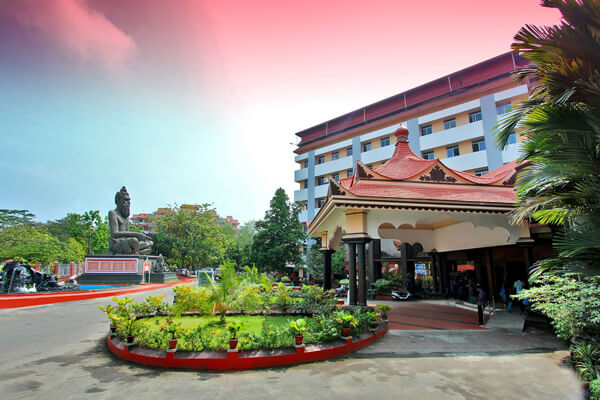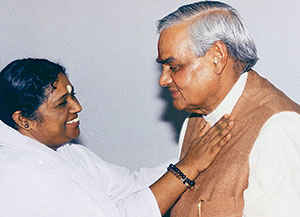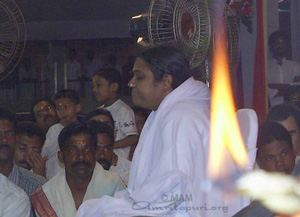(From Amma’s benedictory address at the inauguration of Amrita Institute of Medical Sciences and Research Centre (AIMS), May 17, 1998)
Salutations to all of you, who are the embodiments of love, the embodiments of the Self. Amma is not here to give a speech, nor is it Her way to exhort what others do. But Mother would like to say a few things in the light of Her own experience.
My children, life is meant not only for winners, but for losers as well. Usually people think and speak only about their successes and their achievements. But to gain any real, lasting achievement, we need to pay more attention to and think about our failures as well. We like to take the credit for our achievements, thinking that they are due to our efficiency and our abilities, while we blame our co-workers and others for our failures.
It is human nature to claim that others are responsible for our failures, saying that had they only heeded our advice, everything would have been all right. All this is due to us having the wrong attitude about failure.
The very fact that a person has met with failure proves that he has taken up a challenge, that he has been adventurous. Any action provides a challenge. Learning to drive, climbing a mountain, writing an examination, going deep-sea fishing or even for a toddler to learn how to walk is a challenge. In every task there is a certain amount of adventure involved. Whenever a task is undertaken, success and failure follow like a shadow. So sometimes we succeed and other times we fail.
We shouldn’t be afraid of failure. If we are afraid, we will never be able to succeed, we won’t gain anything out of life. That is why we should encourage and support the losers as well. We encourage someone in order to inspire them and to remove their fear of failure. In sports and games, the loser is often given a consolation prize, which is meant to encourage them. Encouragement is beneficial in every way.
The world belongs to the vanquished as well as the victor. Knowing this, we should be forgiving and bear with those who fail. We should give them every opportunity to try again. To be patient and forgiving is like applying grease to an engine. Patience and forgiveness encourage a person to move forward with renewed strength. The effect of our forbearance is like the power of gravity, which, though invisible, is experienced by everyone. Let us give those who have failed every opportunity to try again and again. Don’t write anyone off just because he or she may have failed once for that would be an even bigger failure on our part. Opportunities should be available not only for the triumphant, but also for the fallen. Nowadays only the victors are given recognition, while the losers are often ridiculed. But instead of ridiculing the losers, we should encourage them. People are enthusiastic only if they are given the encouragement they need.
Life is meant for the courageous and adventurous, not for those who are pessimistic or afraid of failure. The greatest failure in life is to expect victory in every single situation. Spirituality teaches us this principle. Only when we live with this understanding is any new creation possible. By new creation Amma means giving birth to a new, really positive generation.
Forgiveness gives us the impetus to move forward. Both the one who forgives and the one who is forgiven are taken to new heights. To forgive and forbear does not mean that we should lose our discrimination and be doormats for others. It means that we allow the vanquished to be right up there with the victor and that we move forward together. Only if we understand this principle can we know what real service is, and be of any real benefit to others.
Most of the construction work of this hospital and other ashram institutions was not done by contractors. Many of Amma’s children who had no previous experience in this field came forward to take up the task with love and dedication. As a result, a few flaws and mistakes did occur. But instead of reallocating the jobs to experts, Amma’s children were given the opportunity to correct their mistakes and to proceed further. Hence, within a short period of time, much more than the expected target was successfully completed. Had they been denied the opportunity to try again, their abilities would not have blossomed.
Real service is born out of love and dedication. To serve with dedication can be compared to a circle, for a circle has no beginning or end. Love doesn’t have a beginning or end either. Love exists for love’s sake only. Love has no expectations.
Those who work with us should be looked upon as God’s gifts to us. But to feel this, we have to love. When there is love we are able to forgive. That is what Sri Rama taught us when He went and bowed down at the feet of Kaikeyi, who made him forgo the crown, exiling him to the forest for 14 years. Lord Krishna gave liberation to the hunter who shot Him with an arrow and thereby became instrumental in the Lord’s departure from the world. The Lord readily forgave the man for his thoughtless action. In the same way, Jesus kissed the feet of Judas, even though He knew that Judas was about to betray Him. Such are the examples shown to us by our forefathers. If we take these examples to heart, we will surely be able to enjoy lasting peace in this life.
What can we do for the progress of the nation and for the welfare of the whole world? This is the question that we have to ask ourselves. Let us mould a group of people who are strong, courageous, selfless and dedicated to the cause of humanity. Only then can this nation develop and prosper. That is what Krishna did. He instilled power, valour and efficiency in Arjuna, and made him the great warrior that he used to be. Krishna transformed Arjuna’s way of looking at life. As Arjuna imbibed Sri Krishna’s words, he did not curse or flee from the situation. Instead he was able to move forward, battling with unfading enthusiasm.
Buddha’s contribution did not end with His death. He created many Buddhas. The same is true of Christ. These Mahatmas created people who were able to contribute much to the world, not only during their lifetimes, but beyond them as well. The greatest gift we can give to the nation is the new generation we are creating. Whether this nation develops or declines depends entirely on the strength of the coming generations.
We should learn to have the attitude of a beginner. Look at a child. Only a child can develop, because he is innocent, and not egoistic. Today, our bodies have grown, but not our minds. For the mind to expand so that it encompasses the whole universe, we need the patience perseverance, enthusiasm and loving trust of a child. We have to awaken the child within us — the innocence within us. And we have to become egoless. Only then can we receive God’s grace.
There is a power behind the universe. We are all being tossed around by that power. Sometimes we may be carried to great heights. At such times we may be wealthy, successful, even famous. But when that power ceases to propel us, we will come tumbling down. We should live our lives with an understanding of this.
Amma remembers a story: There was a heap of stones. A boy came along and playfully picked up a stone and threw it upwards. As the stone was soaring through the heights, it felt proud of itself. “Look at me,” it thought. “While others are just lying down there, I am soaring this high. I am moving with the sun and the moon.” And it called down to the other stones, “Why are you all lying down there? Come and join me up here!” Poor stones! What could they do? They consoled themselves saying, “What to do? For everything there is a time and a tide.” But the flying stone did not exult for long. When the force of the throw began to decline, the stone began to feel dizzy, and soon it fell down. Finally, lying once again on the pile of stones, it said to the other stones, “Having seen your plight, I came down here out of compassion!”
People always find some excuse or other for everything. They are not prepared to admit their mistakes. This is what we see in the world.
Often we have the knowledge in us and yet we fail to put that knowledge into practice. Once a doctor visited a home where his host offered him a choice between the fresh milk from a tender coconut or a cola drink. Even though he knew that nothing quenches your thirst like coconut milk and that cola drinks are bad for your health, he nevertheless chose the cola. Because it is fashionable nowadays to drink unhealthy soft drinks, he avoided choosing the coconut milk. So our knowledge is not reflected in our actions. Only when we begin putting our knowledge into practice will we experience any benefit of our knowledge.
Everybody wants to take from society, but no one is prepared to give.
A man fell into a well and called for help. A passer-by came and told him to give him his hand so that he could pull him out. “No, no,” said the man in the well. “How can I pull you out unless you give me your hand?” asked the passer-by. Then he said, “Alright then, take my hand.” And as he again extended his hand, the man in the well was suddenly very happy to take it.
This is how it is with most people. Everyone wants to take, but no one wants to give. If this attitude prevails, it could lead to the downfall of the nation. Even if we are not able to create young people who always give, we should at least be able to provide the nation with people who both give and take. Only then will there be harmony in our nation — nay, in the whole world. My children strive hard to understand this.



